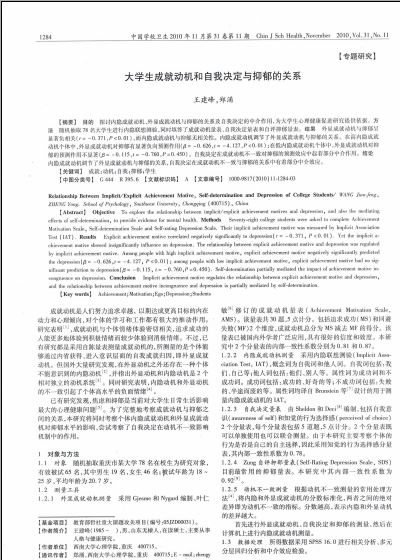大学生成就动机和自我决定与抑郁的关系(3)
 |
| 第1页 |
参见附件(2323KB,3页)。
[4] BAUMANN N, KASCHEL R, KUHL J. Striving for unwanted goals: Stress-dependent discrepancies between explicit and implicit achievement motives reduce subjective well-being and increase psychosomatic symptoms. J Pers Soc Psychol, 2005,89(5):781-799.
[5] 李虹,王善慧.大学生的焦虑状况调查.中国临床心理学杂志,2003,11(2):148-149.
[6] 叶仁敏,KUNT AH.成就动机的测量与分析.心理发展与教育,1992,3(2):14-16.
[7] BRUNSTEIN JC, SCHMITT CH. Assessing individual differences in achievement motivation with the implicit association test. J Resea Pers, 2004,38(6):536-555.
[8] SHELDON KM, RYAN RM, REIS H. What makes for a good day? Competence and autonomy in the day and in the person. Pers Soc Psychol Bull, 1996,22(12):1270-1279.
[9] 汪向东,王希林,马弘,等.心理卫生评量定表手册:增订版.北京:中国心理卫生杂志社,1992:194-196.
[10]COHEN J, COHEN P. Applied multiple regression/correlation analyses for the behavioral sciences. Hillsdale, NJ: Erlbaum, 1983.
[11]温忠麟,侯杰泰,张雷.调节效应与中介效应的比较与应用.心理学报,2005,37(2):268-274.
[12]王俊山,祝春兰.大学生自我价值感与成就动机等心理特点的关系研究.四川心理科学,2001,1:6-10.
[13]郭力平.焦虑、抑郁症状个体的社会认知特点研究.第九届全国心理学学术会议文摘选集,2001.
[14]DECI EL, RYAN RM. Intrinsic motivation and self-determination in human behavior. New York: Plenum Press, 1987.
(收稿日期:2010-04-23)
共3页
您现在查看是摘要介绍页,详见PDF附件(2323KB,3页)。